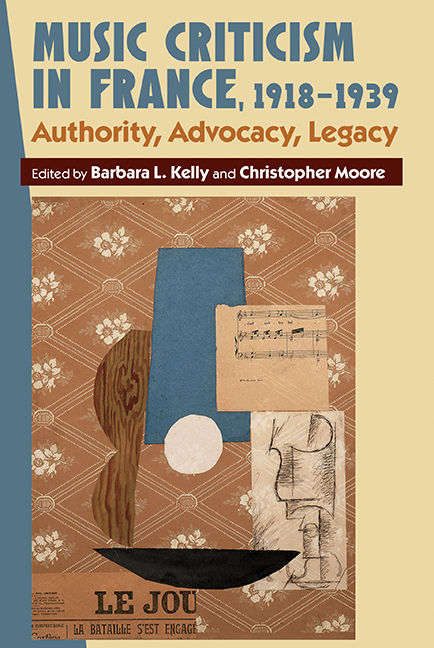Book contents
- Frontmatter
- Contents
- List of Figures
- List of Tables
- List of Contributors
- Acknowledgements
- Introduction: The Role of Criticism in Interwar Musical Culture
- 1 Music Criticism and Aesthetics During the Interwar Period: Fewer Crimes and More Punishments
- 2 Nostalgia and Violence in the Music Criticism of L'Action française
- 3 Charles Koechlin: The Figure of the Expert
- 4 Bleu-horizon Politics and Music for Radio Listeners: L'Initiation à la musique (1935)
- 5 Common Canon, Conflicting Ideologies: Music Criticism in Performance in Interwar France
- 6 Arthur Honegger: Music Critic for Musique et Théâtre (1925–1926)
- 7 A Woman's Critical Voice: Nadia Boulanger and Le Monde musical, 1919–1923
- 8 From a Foreign Correspondent: The Parisian Chronicles of Alejo Carpentier
- 9 Debussy's ‘Reputational Entrepreneurs’: Vuillermoz, Koechlin, Laloy and Vallas
- 10 The Legacy of War: Conceptualising Wartime Musical Life in the Post-War Musical Press, 1919–1920
- 11 Satie, Relâche and the Critics: Controversies and Legacy
- 12 Creating a Canon: émile Vuillermoz's Musiques d'aujourd'hui and French Musical Modernity
- Selected Bibliography
- Index
1 - Music Criticism and Aesthetics During the Interwar Period: Fewer Crimes and More Punishments
Published online by Cambridge University Press: 17 July 2019
- Frontmatter
- Contents
- List of Figures
- List of Tables
- List of Contributors
- Acknowledgements
- Introduction: The Role of Criticism in Interwar Musical Culture
- 1 Music Criticism and Aesthetics During the Interwar Period: Fewer Crimes and More Punishments
- 2 Nostalgia and Violence in the Music Criticism of L'Action française
- 3 Charles Koechlin: The Figure of the Expert
- 4 Bleu-horizon Politics and Music for Radio Listeners: L'Initiation à la musique (1935)
- 5 Common Canon, Conflicting Ideologies: Music Criticism in Performance in Interwar France
- 6 Arthur Honegger: Music Critic for Musique et Théâtre (1925–1926)
- 7 A Woman's Critical Voice: Nadia Boulanger and Le Monde musical, 1919–1923
- 8 From a Foreign Correspondent: The Parisian Chronicles of Alejo Carpentier
- 9 Debussy's ‘Reputational Entrepreneurs’: Vuillermoz, Koechlin, Laloy and Vallas
- 10 The Legacy of War: Conceptualising Wartime Musical Life in the Post-War Musical Press, 1919–1920
- 11 Satie, Relâche and the Critics: Controversies and Legacy
- 12 Creating a Canon: émile Vuillermoz's Musiques d'aujourd'hui and French Musical Modernity
- Selected Bibliography
- Index
Summary
In this chapter, I will explore the theoretical and ideological foundations of music criticism as it was practised between the two wars, and I will do so as a means of outlining a typology of its primary aesthetic topics. Ideally, this study could contribute to defining the role of the press during this period with respect to how it imagined the future of musical creation in France. Yet, what is most surprising is that, rather than foreseeing a positive future, some perspicacious critics in the 1920s and 30s actually announced the collapse of a certain musical order, one that would occur during the aftermath of the Second World War.
Even though the most glorious period of the French musical press took place during the struggle between modernists, conservatives and traditionalists before the Great War, its reconfiguration (necessitated by the War and the evolution of economic and social conditions at the beginning of the 1920s) did not prevent it from continuing to play an essential role in defining the new aesthetic stakes with which the French and international music world were now confronted. That said, the dynamic relationships between the press, the musical world and French audiences and readers evolved gradually. Following the First World War, music criticism continued to recount daily musical life with admirable verve. Perhaps it was at times too poetic or too combative, but unlike the pre-war period, it no longer positioned itself so readily on the side of any particular musical ‘camp’, which, during the 1920s, had mainly dissolved in favour of a constellation of various aesthetic orientations. Confronted with this multiplicity, the musical press hesitated. It no longer launched headlong into the aesthetic arena without having previously reflected on a coherent battle plan for a conflict that appeared more and more difficult to win. The musical press still examined works, of course, but other questions emerged that seemed to hold even greater import, including the role of music in society, or even – with the appearance of technologies such as recordings, radio and cinema – the future of the entire sound world.
Criticism also experienced a self-critical turn and began to question its capacity to play a role in building a vibrant musical culture.
- Type
- Chapter
- Information
- Music Criticism in France, 1918–1939Authority, Advocacy, Legacy, pp. 17 - 42Publisher: Boydell & BrewerPrint publication year: 2018
- 1
- Cited by



